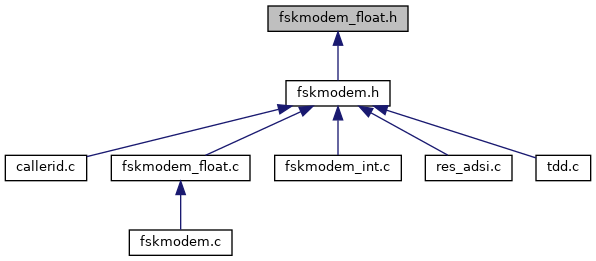FSK Modem Support. More...

Go to the source code of this file.
Data Structures | |
| struct | fsk_data |
Macros | |
| #define | NCOLA 0x4000 |
| #define | PARITY_EVEN 1 |
| #define | PARITY_NONE 0 |
| #define | PARITY_ODD 2 |
Functions | |
| int | fsk_serial (fsk_data *fskd, short *buffer, int *len, int *outbyte) |
| Retrieve a serial byte into outbyte. Buffer is a pointer into a series of shorts and len records the number of bytes in the buffer. len will be overwritten with the number of bytes left that were not consumed. | |
Detailed Description
FSK Modem Support.
- Note
- Includes code and algorithms from the Zapata library.
Definition in file fskmodem_float.h.
Macro Definition Documentation
◆ NCOLA
| #define NCOLA 0x4000 |
Definition at line 32 of file fskmodem_float.h.
◆ PARITY_EVEN
| #define PARITY_EVEN 1 |
Definition at line 28 of file fskmodem_float.h.
◆ PARITY_NONE
| #define PARITY_NONE 0 |
Definition at line 27 of file fskmodem_float.h.
◆ PARITY_ODD
| #define PARITY_ODD 2 |
Definition at line 29 of file fskmodem_float.h.
Function Documentation
◆ fsk_serial()
| int fsk_serial | ( | fsk_data * | fskd, |
| short * | buffer, | ||
| int * | len, | ||
| int * | outbyte | ||
| ) |
Retrieve a serial byte into outbyte. Buffer is a pointer into a series of shorts and len records the number of bytes in the buffer. len will be overwritten with the number of bytes left that were not consumed.
- Return values
-
0 Still looking for something... 1 An output byte was received and stored in outbyte -1 An error occured in the transmission He must be called with at least 80 bytes of buffer.
Definition at line 224 of file fskmodem_float.c.
References a, demodulator(), get_bit_raw(), GET_SAMPLE, len(), fsk_data::nbit, fsk_data::nstop, fsk_data::parity, fsk_data::spb, fsk_data::state, STATE_GET_BYTE, STATE_SEARCH_STARTBIT, STATE_SEARCH_STARTBIT2, STATE_SEARCH_STARTBIT3, fsk_data::x1, and fsk_data::x2.
Referenced by callerid_feed(), callerid_feed_jp(), and tdd_feed().